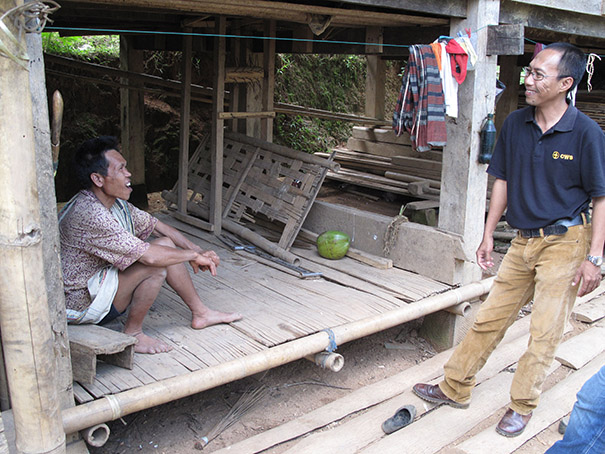
Harun (right) meets with Mr. Limban, a resident of Tana Toraja who is sharing his story about being affected by landslides. Photo: CWS
On World Humanitarian Day, we recognize the humanitarian aid workers who stand on the front lines of conflict and disaster, braving tremendous dangers and difficulties to help those who need it most.
One of these humanitarian aid workers is my colleague, Harun Tambing.
Harun has been a team member and leader in many of the humanitarian response actions that CWS Indonesia has undertaken in the last 15 years, including facilitating the delivery of temporary shelter for internally displaced people and working with communities to build water supply and sanitation facilities for earthquake survivors.
Now, Harun is working closer to home. Literally. He heads up our disaster risk reduction program in Tana Toraja, South Sulawesi, where he’s from. Needless to say, his experience and knowledge of Tana Toraja and its local language and culture make him a key asset.
Indonesia is one of the most culturally and linguistically diverse nations in the world. More than 365 languages are spoken in addition to the official language, which is Indonesian. Most people are fluent in Indonesian, but in some of the remote areas where CWS staff works, people prefer to use their own language.
I joined the CWS team in Indonesia 15 years ago. At the time, the country was in the middle of a difficult transition to democracy. Several parts of this vast archipelago were rocked by communal violence. At one point, more than a million people were displaced and CWS was involved in response efforts, supporting families with water and sanitation facilities, food, blankets and temporary shelter.
My background in Southeast Asian Studies and my fluency in Indonesian helped me navigate unfamiliar terrain, as did my CWS colleagues. Their deep understanding of their country’s current events as well as its history gave me insight and guidance.
In the 15 years since that emergency, Indonesia’s humanitarian crises have continued and changed. For years after the cataclysmic Indian Ocean Tsunami on December 26, 2004, Indonesia suffered a series of natural disasters including three major earthquakes, two tsunamis and several volcanic eruptions. As a result, much of CWS’s work was focused on helping survivors recover and rebuild.
Now, our focus has shifted to an evolving crisis as the number of refugees in Indonesia has grown dramatically. As a key partner of the UNHCR, CWS has been supporting asylum seekers and refugees in Jakarta since 2008. When we started, there were fewer than 500 refugees. Now, there are more than 13,000 from about 40 nations. Our urban refugee program has expanded in line with growing needs. Our staff support protection and services for refugees, including more than a hundred unaccompanied and separated children.
Meanwhile, in Indonesia it isn’t a question of whether another disaster will happen. It’s a question of when. And because of colleagues like Harun and many others, CWS is always ready to respond. It has been a privilege to work alongside colleagues like Harun and his team in Tana Toraja and to witness their commitment, compassion and professionalism. We have more than 50 colleagues in Indonesia, and it is each of them who I want to lift up and recognize today. We have many stories, but we are one humanity.
Michael Koeniger is the CWS Country Representative in Indonesia.
